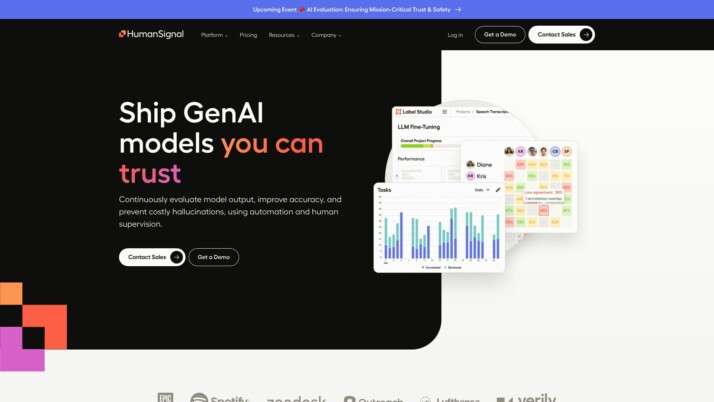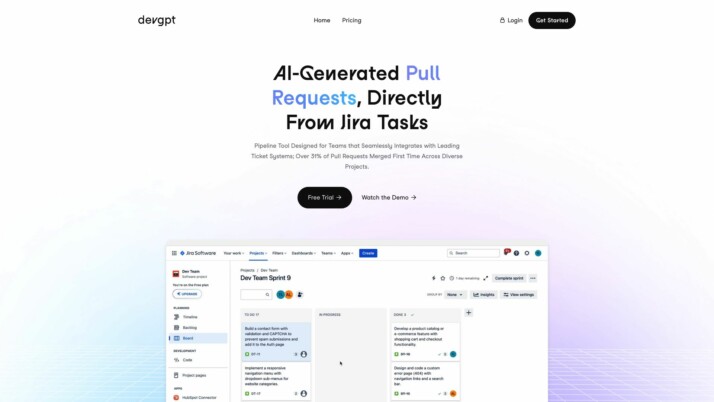Adala vs. DevGPT: A Comprehensive Feature Comparison
In the ever-evolving landscape of AI development, two powerful contenders have emerged, each vying to revolutionize how we approach coding and automation: Adala vs. DevGPT. Whether you’re a seasoned developer seeking the ultimate productivity boost or a tech enthusiast eager to explore the cutting edge, understanding the nuances between these AI giants is crucial.
Dive into our comprehensive feature comparison to discover how Adala and DevGPT stack up against each other, and which one might be your ideal ally in the quest for innovation. Get ready to uncover the future of AI-driven development!
Adala Overview
Adala is an open-source framework designed to create autonomous data labeling agents. These agents leverage large language models like GPT-3 to acquire specialized skills such as text classification, summarization, and question answering.
One of Adala’s key strengths is its modular architecture, allowing users to develop customized agents tailored to their specific data labeling needs. The agents learn from labeled datasets provided by users, ensuring they align with desired outcomes. Crucially, Adala facilitates a tight feedback loop, enabling agents to request human input to refine their skills continuously, leading to more reliable results.


Adala’s vision is to increase the efficiency and cost-effectiveness of data labeling while maintaining high quality through human guidance. Its open-source nature encourages community involvement, fostering an ecosystem of contributors working towards more advanced and versatile agents. For developers, researchers, and data scientists, Adala presents an intriguing framework for exploring the possibilities of autonomous labeling agents.
DevGPT Overview
DevGPT is an AI-powered coding assistant focused on automating tasks for software developers. Its core capability revolves around translating natural language descriptions and prompts into executable code snippets.


The platform allows developers to describe their coding requirements in plain English, and it will generate context-relevant code automatically. One standout aspect of DevGPT is its ability to train the AI model on a developer’s existing codebase, enabling it to produce code that aligns with their preferred style and conventions.
DevGPT integrates seamlessly with popular developer tools like GitHub and Jira, streamlining the process of generating pull requests directly from tasks or tickets. By leveraging advanced language models like GPT-4 and Codex, DevGPT empowers developers with intelligent code generation capabilities that can save significant development time.
Although the current focus seems to be on serving individual developers and small teams, DevGPT has a broader vision of becoming an indispensable AI-powered coding companion for software teams of all sizes. By fostering an engaged community of users and contributors, DevGPT aims to continuously evolve its product offerings and expand its reach across the industry.
Feature Comparison
Adala and DevGPT differ significantly in their focus areas and core capabilities. Adala is an open-source framework designed to create autonomous data labeling agents, while DevGPT is an AI-powered coding assistant specifically tailored for software developers.
One key distinction is that Adala allows users to build agents capable of acquiring specialized skills like text classification, summarization, and question answering. These agents learn from labeled datasets provided by users, enabling a tight feedback loop for continuous improvement and reliability. In contrast, DevGPT focuses primarily on translating natural language descriptions into executable code snippets, streamlining the coding process for developers.
Adala’s modular architecture encourages community contributions and extensibility, facilitating the creation of diverse agents through a combination of skills, runtimes, datasets, and environments.
Furthermore, Adala’s modular architecture encourages community contributions and extensibility, facilitating the creation of diverse agents through a combination of skills, runtimes, datasets, and environments. DevGPT, on the other hand, integrates seamlessly with popular developer tools like GitHub and Jira, optimizing its functionality for software engineering workflows.
While Adala’s agents demonstrate problem-solving capabilities and the ability to learn and improve over time, DevGPT leverages advanced language models like GPT-4 and Codex to generate context-relevant code efficiently. This highlights a fundamental difference in their intended use cases and target audiences.
Feature Comparison Table
| Adala | DevGPT | SmythOS | |
|---|---|---|---|
| CORE FEATURES | |||
| Memory & Context | ✅ | ✅ | ✅ |
| Problem-Solving Capabilities | ✅ | ✅ | ✅ |
| Human-AI Interaction | ✅ | ✅ | ✅ |
| Debug Tools | ❌ | ✅ | ✅ |
| Multi-Agent Collaboration | ✅ | ❌ | ✅ |
| COMPONENTS | |||
| Foundation AIs | ✅ | ❌ | ✅ |
| DATA LAKE SUPPORT | |||
| TXT File Support | ✅ | ✅ | ✅ |
Best Alternative to Adala and DevGPT
While both Adala and DevGPT offer innovative approaches within their respective domains, SmythOS emerges as the superior alternative for creating AI agents across a wide range of use cases. With its intuitive drag-and-drop interface, extensive API integrations, and support for various AI models, SmythOS provides accessible tools to rapidly build and deploy powerful AI solutions.
SmythOS stands out by offering a seamless visual builder that empowers users, even those without extensive coding experience, to construct complex AI workflows effortlessly.
SmythOS stands out by offering a seamless visual builder that empowers users, even those without extensive coding experience, to construct complex AI workflows effortlessly. This democratizes AI development, making it accessible to a broader audience. Furthermore, the platform’s robust integration capabilities allow for smooth connectivity with existing systems, APIs, and data sources, ensuring a seamless fit into any existing infrastructure.
Another key advantage of SmythOS is its support for a diverse range of AI models from multiple providers like OpenAI, Anthropic, and Hugging Face. This flexibility allows users to leverage the strengths of different models, combining them to create highly specialized and effective AI agents tailored to their unique requirements.
Moreover, SmythOS excels in deployment options, enabling users to deploy their AI agents as APIs, webhooks, chatbots, or even scheduled agents. This versatility ensures that the AI solutions developed on the platform can be seamlessly integrated into various environments, from websites to enterprise systems, maximizing their impact and applicability.
While Adala and DevGPT excel in their respective niches of data labeling and coding assistance, SmythOS offers a more comprehensive and versatile solution for creating AI agents for a wide array of applications. Its focus on user-friendliness, extensive integrations, and flexible deployment options make it the superior choice for businesses, developers, and individuals seeking to harness the full potential of AI across diverse domains. Get started with a free SmythOS account today to experience the power of no-code AI development.
Conclusion
In our pursuit of harnessing the boundless potential of AI, SmythOS emerges as the premier platform, outshining alternatives like Adala and DevGPT. With its intuitive drag-and-drop interface, extensive suite of integrations, and deployment flexibility, SmythOS democratizes AI development, making it accessible to businesses, developers, and individuals alike.
SmythOS’ standout feature is its seamless integration with a diverse ecosystem of APIs, AI models, and frameworks from industry leaders like OpenAI, Anthropic, and Hugging Face. This unparalleled flexibility empowers users to create highly specialized AI agents tailored to their unique requirements, combining the strengths of multiple models to drive innovation.
SmythOS excels in deployment versatility, enabling users to effortlessly deploy their AI agents as APIs, chatbots, or even scheduled agents.
Moreover, SmythOS excels in deployment versatility, enabling users to effortlessly deploy their AI agents as APIs, chatbots, or even scheduled agents. This versatility ensures that the transformative power of AI can be seamlessly integrated into various environments, from websites to enterprise systems, maximizing its impact across industries.
To unlock the full potential of SmythOS, we invite you to explore our pre-built AI templates and create a free Smyth account. Experience firsthand how our 300,000+ integrations and comprehensive documentation empower you to deploy AI agents anywhere, revolutionizing your workflows and driving unprecedented innovation. Don’t just take our word for it – check out the glowing testimonials from our satisfied customers and see why SmythOS is the ultimate choice for no-code AI development.
Last updated:
Disclaimer: The information presented in this article is for general informational purposes only and is provided as is. While we strive to keep the content up-to-date and accurate, we make no representations or warranties of any kind, express or implied, about the completeness, accuracy, reliability, suitability, or availability of the information contained in this article.
Any reliance you place on such information is strictly at your own risk. We reserve the right to make additions, deletions, or modifications to the contents of this article at any time without prior notice.
In no event will we be liable for any loss or damage including without limitation, indirect or consequential loss or damage, or any loss or damage whatsoever arising from loss of data, profits, or any other loss not specified herein arising out of, or in connection with, the use of this article.
Despite our best efforts, this article may contain oversights, errors, or omissions. If you notice any inaccuracies or have concerns about the content, please report them through our content feedback form. Your input helps us maintain the quality and reliability of our information.
